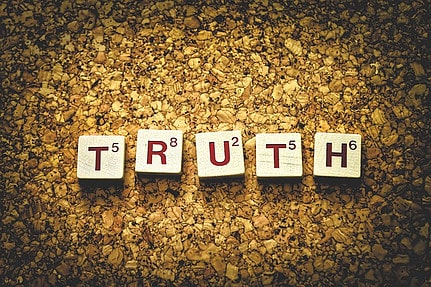Why The Truth Will Set You Free- It’s Emotional

As evident, I won’t claim that today’s subject is straightforward because it isn’t. Given this, some of you may ponder the relevance of truthfulness and why it holds the key to liberation in the present era. While this question may appear intriguing or challenging, the focus this time is on fostering greater honesty within oneself and with those in your circle. By introspectively exploring the reasons behind any reluctance to be truthful, you empower yourself to guide others in embracing truthfulness in their own lives.
Once individuals grasp the essence of truthfulness, they will come to recognize the significance and importance of honesty. In all honesty, if the importance of being truthful isn’t acknowledged from the outset, initiating positive changes in various aspects of life becomes challenging. Ultimately, the decision to embrace truthfulness and the measures taken to achieve it rests in your hands.
With everything considered, in the course of this essay, I will explore the definition of truth, the significance of embracing truthfulness, the underlying concept of truth, and the prerequisites for individuals to become more honest. In some ways, all of this is essential for one’s growth and development. Which, will have a positive impact on your life.

What is the Truth
Concerning both physical and mental well-being, I deem it essential to initially comprehend the nature of truth. This understanding is foundational before delving into the mechanisms of truth regarding self-love and acceptance.
The attribute of truth inside facts and reality is described as that of the truth. Without delving deeply, this is how one’s perspectives, foundations, and affirmations have developed. In essence, it involves articulating statements that encapsulate authentic and accurate intellectual facts within the narrative.
The prefrontal cortex, responsible for electrical activity in the brain, plays a role in determining whether to tell the truth or lie. This recognizes the reality that many individuals may not discern fabricated statements.
Various electron levels activate neurons in the brain, influencing the capacity for honesty. As an illustration, millions of neurons interact within the prefrontal cortex, collaborating to facilitate the process of being truthful.
Truthfulness involves placing complete trust in what is accurate, irrespective of personal statements or beliefs. Therefore, regardless of personal agreement, individuals possess the information to articulate factual statements.
Consequently, the truth can be perceived as a means of expressing something supported by thorough evidence. Attributes such as absoluteness, correspondence, coherence, universality, exclusivity, and objectivity are inherent qualities of truth.
Why is it Vital to be Truthful
The significance lies in its capacity to facilitate learning and personal development, permeating every aspect of one’s existence. It also aids individuals in deriving lessons from their mistakes, enabling them to progress and move forward in life.
Embracing truthfulness provides various benefits, including the convenience of not having to remember falsehoods and gaining access to more authentic and trustworthy relationships. Once this commitment to honesty is recognized, other aspects of life naturally align. This underscores the vital role of honesty in the journey of self-discovery.
Truthful vs. Honesty
Many individuals may not realize that being true and being honest are distinct concepts. There is a common assumption that when someone is truthful, they are also being honest. However, this is not accurate. Being truthful involves considering the facts, while being honest involves expressing a characteristic or trait.
When an individual speaks the truth, it is because they are aware of the facts and have a willingness to convey them to others. On the other hand, those who are honest exhibit this quality as an inherent trait, demonstrating a sincere commitment to being truthful and transparent with people.
In this section, I’ll talk about the differences between truth and honesty.
- Truth is defined as a judgment or even a notion held to be genuine, whereas honesty is a sincere trait that allows one to reflect on the facts.
- The truth is a factual attribute, whereas honesty is a human quality.
- Truth emphasizes the veracity of information, whereas honesty emphasizes the traits that make up a person.
For those of you uncertain about the difference between truth and honesty, here’s a clarification.
How May a Person Be More Truthful?
Maintaining truthfulness in life can pose challenges, especially in today’s society, where some individuals may resist hearing the truth due to its potential discomfort. Reflect on the childhood advice about the importance of being truthful to others—it holds true as it contributes to long-term happiness.
If you share the common desire to be loved unconditionally, you might find yourself tempted to say or hide things to protect that connection. Nevertheless, there is nothing amiss in striving to be truthful with others—it boils down to acting with integrity for the right reasons. For instance, telling the truth to emphasize a point becomes a valid approach. Understanding this allows you to be more honest with yourself, ultimately emphasizing the importance of being loyal to those who hold significance in your life.
Continuing from that, here are some essential tips on how to embrace greater truthfulness.
1. Be straightforward: Being straightforward is beneficial for fostering greater truthfulness in one’s life. However, it’s crucial to avoid overthinking or getting overly involved, especially concerning personal growth and well-being. The initial step in self-improvement is to incorporate more honesty into daily life. Ultimately, a direct individual is seen as more attractive and valuable to be around.
2. Stop trying to impress people: In life, self-love is crucial. With that in mind, it’s important to recognize that loving yourself is a prerequisite before extending love to others. There’s no need to go to great lengths to impress others because falsehoods are just that, and the truth will inevitably come to light. By learning to disregard the opinions of others, you pave the way for a more joyful existence. While lying may provide momentary amusement, it proves futile in the long run.
“You really can start living when you stop trying to impress others.”
3. Learn to accept yourself: Embracing self-acceptance stands as a potent means to enhance truthfulness. When an individual realizes their inherent greatness just as they are, others will eventually embrace them for their authentic self, and that’s perfectly acceptable. Ultimately, it boils down to understanding one’s true self. If you can achieve that, there’s no need for deception.
4. Never, exaggerate the truth: At times in life, it might be tempting to present a partial truth or embellish it to enhance your image or appear more captivating. However, conveying information solely to seem more intriguing is never as favorable as being truthful. In the end, the truth will inevitably surface, and your credibility may suffer if it is distorted.
5. Change those negative habits: Deception is never advisable, particularly in trivial matters. For instance, take the case of a detrimental habit. Instead of resorting to falsehoods about negative behaviors, why not take steps to change the habit that prompts you to be untruthful in the first place? Accomplishing this allows you to find contentment with your true self and the direction of your life.
Keep in mind that although seeking approval is natural at times, it becomes detrimental and distressing when you consistently tell people what they want to hear rather than what they need to hear.
Conclusion
Ultimately, embracing the truth in an authentic manner brings freedom, as it prevents one from being weighed down and eventually consumed. This is because there’s an internal need for expression. It’s important to note the significant distinction between being truthful and being honest, hinging on attributes and genuine belief in the communicated information. As a consequence, there are straightforward ways to enhance truthfulness: prioritizing honesty, avoiding attempts to impress others, fostering self-love, refraining from exaggeration, and breaking negative habits. Once these are achieved, everything else naturally falls into place, leading to personal learning and growth.
Feel free to share any questions or concerns about honesty in the comments section below. Drawing on my extensive experience in this domain, I am more than willing to provide assistance and guidance.
Related: Why it’s Important to be Yourself- Genuinity
What is Self-Trust?-Trust with Love
The True Meaning of Self-Awareness
How does Self-Confidence Work?- A Full Breakdown
Kiersti writes on self-love and personal development professionally. Over the past ten or so years, she has studied self-love and personal growth. Visit https://womansdailyneeds.com/ to learn more about what she does, and like her on Facebook at https://facebook.com/womansdailyneeds to keep up with her.



